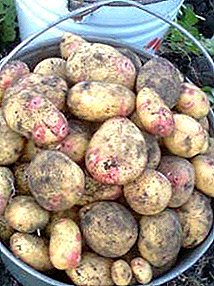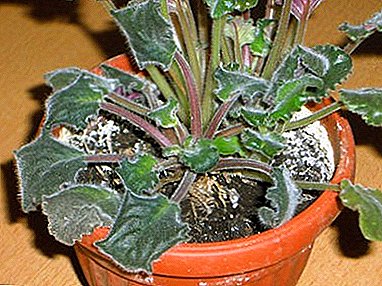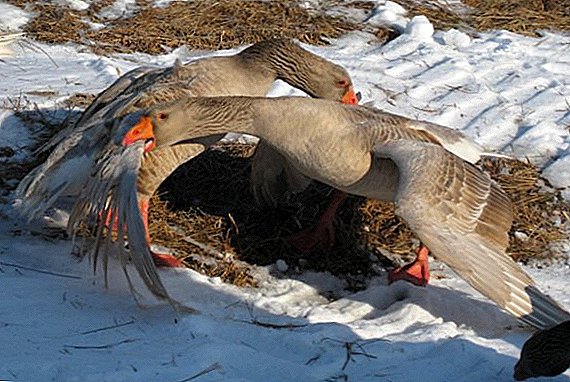
Forty days - collective name of several ultra early varieties, giving a harvest already on the 40th day after planting.
These varieties are different good yield, but the taste of young tubers is less bright than that of later potatoes.
Variety of potatoes Sorokodnevka description
- tubers of medium size, weighing from 80 to 120 g;
- oval or round-oval shape;
- the peel is thin, evenly colored, smooth or slightly rough;
- the color of the skin is light, from white to pale yellow or pinkish;
- small, shallow, unpainted eyes;
- the pulp on the cut is creamy or pale yellow;
- starch content is moderate, ranging from 11 to 15%;
- high content of protein, valuable amino acids, beta carotene.

Characteristics of potatoes
Potato Sorokodnevka - a common name for very early varieties.
Most often under this name appear varieties of national selectionwhich are quite difficult to identify within the State Register.
Ultravoltage varieties different tolerance to weather extremes, they put up with light frosts and not too fertile soils. Able to tolerate short-term drought.
In regions with a warm climate, the Forty Day is planted 2 or even 3 times a year. Productivity is good, depending on the composition of the soil and climate from 1 hectare can be collected from 200 to 300 centners of potatoes.
Bushes are medium in size or tall, fairly sprawling. Abundant formation of green mass, leaves of medium size, dark green, with slightly wavy edges. The corolla is made up of large white, fast-falling flowers. Berries are rarely tied.
Potato Forty Day badly stored, cannot take long distances. But it is great for sale. Early beautiful tubers are in good demand and allow you to quickly realize the harvest.
Early ripening protects potatoes from many unpleasant diseases of the nightshade. It is rarely affected by potato cancer or common scab, resistant to viruses. Practically not affected by late blight of the leaves and tubers.
The taste of potatoes is pleasantbut not too bright. The 40th day is not watery and not dry, moderate starch content does not allow the roots to darken during cutting and cooking.
Cooking is moderate. The best use of tubers is cooking boiled whole potatoes, roasting, stuffing, deep-frying.
A photo
The photo shows a potato variety Forty:





Advantages and disadvantages
Among main advantages varieties:
- very early maturation;
- pleasant taste of tubers;
- good yield;
- unpretentiousness;
- tolerance to drought, lower temperatures, heat;
- universality of tubers;
- seed material does not degenerate for a long time;
- resistance to major diseases.
Despite a lot of merit, the variety has drawbacks. Collected tubers are very poorly storedIt is recommended to use them immediately after digging. Because of the thin skin, the roots may be damaged when digging, therefore harvesting is done only by hand.
Features of growing
For many novice gardeners, the question arises: when do you plan to plant potatoes? He lands in the springThe soil should warm up to 10 degrees, but keep a good supply of moisture.
In regions with a warm climate, planting is possible at the end of March, but more often the tubers are planted closer to the beginning of May. After digging out the first harvest, the soil is loosened, fertilizers are applied and the second batch of tubers is planted.
Before planting, the tubers are etched, dried, treated with a growth stimulator. For planting use intact medium-sized potatoes. Non-stock trifle does not guarantee yield, large root crops cannot be obtained.
Bushes are planted at a distance of 30-35 cm friend. Before planting in the hole you can make a little humus and wood ash. During the planting season, roll up 1-2 times, forming high ridges.
Before planting is to determine how many potatoes will be needed. Root crops are very poorly stored, it is advisable to eat them immediately after planting. You only need to store seed, while it will often have to sort out for the rejection of damaged tubers.
Diseases and pests
 Potato Forty Day resistant to many diseases of nightshade. It is rarely affected by potato cancer, golden nematode, scab, or viruses.
Potato Forty Day resistant to many diseases of nightshade. It is rarely affected by potato cancer, golden nematode, scab, or viruses.
Early maturation does not allow plants to become infected with late blight.
For the prevention of tubers before planting pickled, it is recommended to change the sites for planting annually.
Such a strategy will not only protect potatoes from diseases, but also significantly increase yields.
Young fresh tops attract a variety of pests: aphids, Colorado beetles, spider mites, wireworms, cicadas. Timely weeding, preplant treatment of soil and tubers will help protect the planting.
In the case of severe injuries, spraying with insecticides is possible. It is advisable not to carry out processing after the start of flowering bushes.
In the fight against the Colorado potato beetle will help chemicals: Aktara, Corado, Regent, Commander, Prestige, Lightning, Tanrek, Apache, Taboo.
Potatoes Sorokodnevka - a real favorite in private farms. The potato matures quickly, it hurts a little, the tubers have a pleasant taste and beautiful appearance.
Despite the lack of official registration, the variety continues its triumphant march through private gardens, delighting lovers of wholesome early potatoes.












